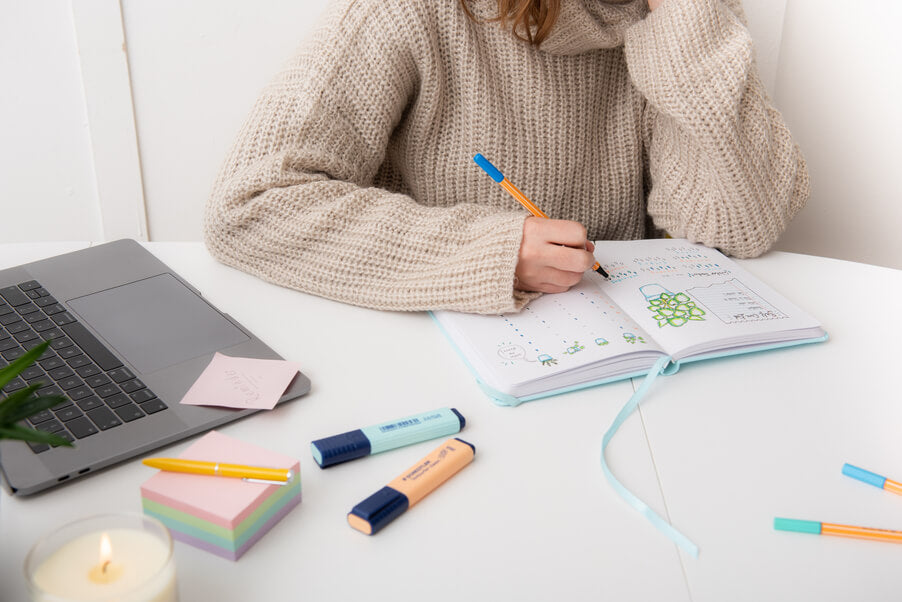Votre panier est vide
Section
Drop element here
21 Types of Journaling - How to Find The Perfect Style for You
There are a lot of different types of journaling out there. Which can make it an exciting (and intimidating) practice to try.
We all know that variety’s the spice of life. But just because one type of journaling’s loved by your best mate, doesn’t mean that it’s going to be the right fit for you. Here’s how to find the right type of journaling that’ll get you turning an irregular practice into a daily habit faster than you can say “pass the pen”.

How do I find my journaling style?
Few of us have the time (or the patience) to try out every type of journaling for ourselves. So here’s how to skip to the good bit and find a practice that works for you.
Step 1 - Decide what you want to get out of it
What’s making you want to try a different type of journaling in the first place?
Perhaps you want to support your mental health, focus on your self-care or explore your creativity. Whatever it is, getting clear on your motivation will help you pick a journaling practice that feels right for you.
Step 2 - Match your journaling practice with your interests
If you’re already a spiritual person, then look for a type of journaling that matches with that interest. Or, if you’re super creative, try a journaling practice that enables you to make the most of that side of you.
This will also make it much easier to stack your journaling habit onto a pre-existing one, meaning you’ll be a regular journaler before you know it.
Step 3 - Be conscious of your current lifestyle
How much time do you have to dedicate to your journaling practice? It’s important to be realistic here.
If you’re already a busy person (or just don’t fancy adding much more into your day) then a time-consuming practice probably isn’t for you. Don’t try to force something that isn’t a natural fit.

1. Bullet journaling 📖
Bullet journaling is pretty special. Why? Well, it combines countless types of journaling into one simple system.
Its inventor, Ryder Carroll, wanted to create a method that enabled people to be both productive and mindful. The idea is that you can organise your thoughts, focus your actions and be more intentional about your choices, all at the same time.
Since then, it’s taken on a life of its own with bullet journalers using it as a way to explore their creativity, express their thoughts and develop a beautiful online community. Here’s how to get started.
2. Memory journaling 💭
Memory journaling is the practice of documenting and logging your thoughts and actions so that you can relive them at a later date.
You can be as creative as you like, turning a dot-grid journal into a scrapbook with ticket stubs, photos, and any other paraphernalia. Or, you can simply write down your thoughts and experiences, adding as much detail as possible to help bring them back to life.
Jae explains how she keeps a memory journal with her former roommate: “One of us keeps the journal for a few weeks and we share current life events, song recommendations or plans we have for the future. It’s our unique way of staying in touch and I can’t wait to see what memories we create and share with one another in the months to come!”
3. Tarot journaling 🔮
Tarot journaling is a popular practice for people who are already regularly drawing tarot cards to get insights into their past, present and future.
By adding a journal into the mix, you’re able to track those readings and monitor your experience. A good way to start is by using the tarot cards as prompts for your daily journaling practice.
4. Morning pages 🌅
If you find yourself constantly distracted by endless to-do lists when what you’re trying to do is follow your creative flow… then Morning Pages might be the “cure” you’re looking for.
The practice is simple. Write three pages of conscious thought each morning.
And the results? All those distractions are out of your head. So you can focus on creating instead. That’s it.
5. Reflective journaling 🤔
This is the type of journaling that many of us tried as young teenagers. Where we’d write out our thoughts, feelings and fears before locking them away somewhere they’d never be found.
It’s a type of journaling that many people dismiss, but it’s actually a pretty healthy practice. Instead of leaving those thoughts up in your head, you’re able to see them on the page. You can analyse your emotions, look at what might be triggering them and start to foster a more positive mindset instead.
6. Goals journaling 💪🏼
What goals are you working towards right now? When you write down your goals, they become tangible. You’re able to see them and feel that they might actually be possible.
A goals journal can help you structure your goals into tasks, actions and milestones to be achieved along the way. Whilst also enabling you to reflect on your progress and any hurdles that are stopping you from achieving your goals.

7. Mood journaling 😊
Nobody likes being in a bad mood. But what if you could prevent that mood from happening in the first place?
That’s what mood journaling helps you do. By tracking your mood, you’re able to look for triggers that cause each mood to occur. Helping you to foster more positive moods (and less negative ones).
8. Gratitude journaling ✨
The theory behind gratitude journaling is that it trains your mind to look for the positive things in your life.
It’s a popular tool in the health and wellness community, and for good reason. Studies have shown that there is a link between gratitude and well-being, suggesting that the more gratitude you experience, the better your well-being will be.
9. Art journaling 🎨
This is a great avenue into journaling for the creatives amongst you. Art journaling is similar to traditional journaling but, instead of writing out your thoughts and experiences, you draw or illustrate them.
If you’re a visual person or enjoy a regular art practice, this is a great type of journaling to try.
10. Dream journaling 💤
Most of us forget our dreams just a few moments after waking up. But there are theories that suggest a lot can be learned from our dreams, including fears, hopes, and (yes) dreams!
Keeping a dream journal next to your bed can be a fun and creative way to document your dreams after waking up. Rather than forgetting those experiences, you can explore them instead.
11. Daily journaling ✅
Most journaling practices are daily but this one goes into more detail and explores the ins and outs of each day. Like a planning practice, you look at what you’re doing each day, what you’re looking to accomplish and how you feel about it all.
It’s simple. Yet, as Thomas Griffin says, “hardly anyone does it”.
12. Book journaling 📚
Imagine having your very own library, that you could carry around with you each day. In its simplest form, that’s a book journal. Your pocket library.
Most book fans will track their favourite reads, but this often takes place online through an app or a website. And that takes something away from the offline act of reading. Which is exactly why we love a book journal to track reading, log abandoned books and speculate on how the story might pan out.
13. Nature journaling 🌿
Whilst some of us might look to websites or blogs to give us prompts for our journaling practice, nature journaling uses the great outdoors instead.
Nature journalers are encouraged to write or draw whatever nature has inspired them to create. Your nature journal is a space to reflect on your experience, log changes in seasons and feel a deeper connection to the world outside your window.
14. Career journaling 🧑🏫
Most careers span several decades. That’s a long time. But, just like a personal journal, a career journal can be used to dive deeper into the motivation behind your work.
Career journaling can help you analyse and overcome problems, set career goals, store memories, track your progress, develop new habits and so much more. And, because it’s in one set journal, you can maintain your work-life balance too.
15. Travel journaling ✈️
How many times have you wished that a trip would never end? A travel journal can help you relive your experience whilst increasing your awareness of little details that you might otherwise miss on the road.
The practice is simple. It involves a pen and a journal, and a willingness to explore someplace new.

16. Food journaling 🥦
If you’re trying to improve your health, eat more healthy foods or shift towards a healthier lifestyle, a food journal can help you develop a better understanding of exactly what you’re putting into your body.
By logging your daily meals, drinks and snacks you’re able to become more mindful of what you’re eating.
17. Fitness journaling 🏋️♂️
Setting a fitness goal is the easy bit. The tricky part comes in actually achieving it. That’s where fitness journaling comes in.
Your fitness journal is a space to track your movement, monitor your progress and check in with motivation for working out in the first place.
18. Moon journaling 🌙
Moon journaling is journaling your emotions in line with the different phases of the moon.
Science suggests that, just like the moon influences the oceans’ tides, it influences our minds and emotions too. And you can tune into that influence, through the power of moon journaling, syncing your focus and productivity with how you’re feeling each month.
19. Spiritual journaling 🙏
Journaling is a powerful practice to better understand your mind, body and soul. In the very same way, it can help you understand your religion or spirituality too.
Having a dedicated place to explore religious teachings, reflect on your spiritual experience or observe the world in a new way can enable you to take a deeper dive into your relationship with your religion.
20. Pregnancy journaling 👶
For most people, pregnancy is a special time that you’re going to want to remember forever. And a journal can help you do that.
Your pregnancy journal is your home for all things baby-related. It’s a place to keep the pictures from that first scan, track any weird and wonderful cravings and finalise that all-important name decision.
21. Your own style of journaling 💛
There are many types of journaling out there. But that doesn’t mean that you can’t create your own version. Don’t be afraid to take your own approach to journaling and develop your practice in a way that works for you.

